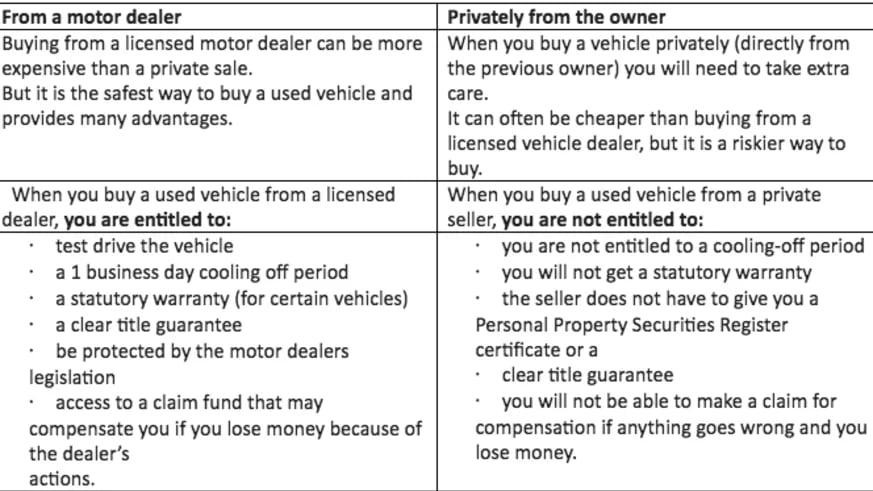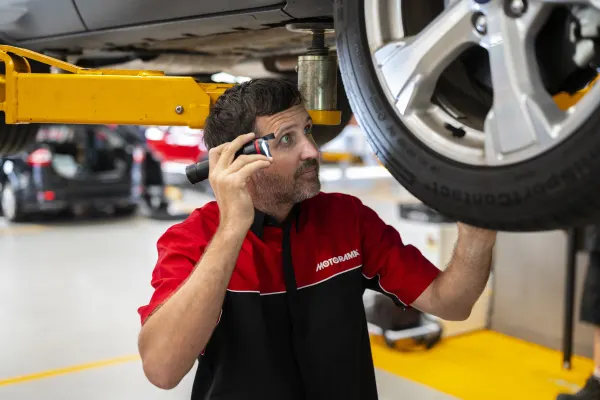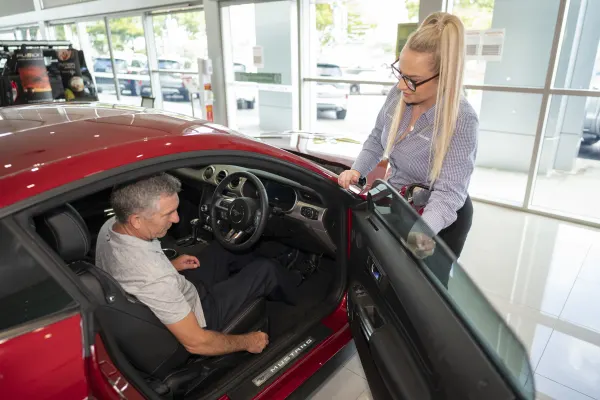
Buying a Car: Private Vs Dealer
Posted in Buyer Advice
Buying a Car: Private Vs Dealer
Private sellers look like they have low prices compared to similar cars at a dealership.
But are you getting the full story?
You’ve narrowed it down to two or three cars, and now you’re shopping around to see if you can get the same model for a better value.
When you compare prices from ordinary sellers on the web to dealers, it might seem like a big cost: for a little more convenience.
But what is behind the price of a dealership car – and why is it sometimes more expensive than a privately sold vehicle?
STAMP DUTY
Stamp duty must be paid on the dutiable value all new and used cars that are changing ownership.
It is based on either the price paid or the market value of the car (whichever is higher) and can add hundreds to the price. Even if you do a ‘mates rates’ deal with the seller, you’ll still have to pay the market value of a car. For example, if your brother “sells” you his car worth $12,000 for just $5,000, the Department of Transport will use the higher market value to assess your stamp duty costs.
In Queensland, the price of stamp duty is based on the engine type of the car you’re buying, with a nominal amount for every $100 worth of their value. Hybrids and electric vehicles cost the least, at $2 per $100 of value, while fuel powered vehicles with 7 or 8 cylinder engines are charged the most at $4 per $100 of value.
There are few exemptions to stamp duty, immediate family members like parents or spouses (but not aunts, uncles or siblings) who transfer the title of the car with no official payment, if you’ve inherited a vehicle from a deceased estate or if you’ve registered the car in Queensland or another state previously.
If you buy from a dealership, the ‘drive away’ price includes your costs like stamp duty and registration, but if you buy a car from a private seller – you’ll have to pay stamp duty directly to the Department of Transport, as well as a transfer fee to change the registration plates into your name or to buy new plates to stick on the car.
WARRANTIES AND GUARANTEES
When you buy from a private seller, you have to pay most of the on-road costs in order to transfer ownership. Most dealerships give you a ‘drive away’ price for their vehicles. This means that once all the paperwork has been signed, you can take that car on to the road and get going.
When you buy from a dealership, there are also statutory warranties enforced by the government to protect used car buyers from major faults that may not show up in the regular pre-purchase inspections.
Some smaller dealerships might have a few cars advertised as ‘as is’ – unregistered with no warranties or guarantees – but these aren’t usually a practical option for people who want a vehicle that will be ready to drive within a short timeframe.
You don’t get any formal guarantees from a private seller either, so once you’ve signed all the transfer papers and handed over the money – you’re pretty much on your own if the car develops problems down the line (or you’d at least have an uphill battle proving that the seller didn’t act in good faith when they sold the car to you.)

RECONDITIONING
When a dealership sells a used car, it has gone through a process to fix up any cosmetic blemishes like scratches or stains, as well as a full mechanical check to ensure that it’s roadworthy. Some places will spend more time and money than others, so it’s worth looking for places that take the effort to actually address any issues under the bonnet – over places that just make the car look good on the outside.
Private sellers are a mixed bag: some owners take the best care of their car, keeping it clean, serviced and in good condition; others treat their cars as nothing more than a means to get from A to B.
No matter how many claims of its “excellent condition” or being “hardly used,” it’s important to have a qualified mechanic look over the car as it’s just as likely that the ‘one owner’ car listed may have been treated poorer than a car with two or three drivers who were diligent with keeping the car in good shape.
COOLING OFF PERIODS
If you buy a house, you get a cooling off period to make sure you can commit to paying that amount of money and if the property suits your needs. Because the car is often many people’s most valuable asset outside of real estate, it makes sense that you should have a cooling off period to think about whether you’re happy to spend thousands on a particular vehicle.
Buying a used car from a dealer, you’ll get a 24-hour cooling off period until closing time on the next business day to decide if you can commit to the finance or if the car will work for your lifestyle. If you drive away with the car off the lot, you’ll forfeit the cooling off-period (unless it’s for a test drive or to take it to an independent mechanic.)
Because of the longer negotiating times with new cars, you don’t get a cooling off period after you sign the contract (because you’re able to customise a vehicle to your requirements) but you are free to change your mind before the contract is signed, and you’re more than able to put any specific requirements into the new car sales contract – such as delivery dates or being subject to finance approval.
Private sellers, auctions and cars sold on consignment are also exempt from any cooling off period, once you’ve bought the car – it’s yours.
RECALL SERVICING
Because of the increased risk during operation, cars are subject to more product recalls than other items. These can be for small items that affect the convenience of the car (i.e. improperly installed trim or faulty switches) through to major issues that affect the safety of passengers or others while driving.
Recall notices are sent out by carmakers, but if you’re not the owner of the vehicle which they have in their records – you might have moved address or you’re the second registered owner – you might miss out on crucial information on how to fix a problem in a car that has been recalled.
Cars sold through dealerships will have their recall items serviced (usually on-site if it’s from a brand sold there), whereas you’ll have to be extra careful to make sure a private seller has had their service book stamped with any recall services. If a seller hasn’t had a recall service performed, you can use that as a negotiation point on the price – because you’ll have to go out of your way to have it done if you decide to buy it.
At Motorama, our used cars have an average of $1,500 spent on them under the hood after trade in to make sure only the best quality used cars are put up for sale.
To see more, contact the friendly sales team at your local Motorama dealership and go for a test drive.


